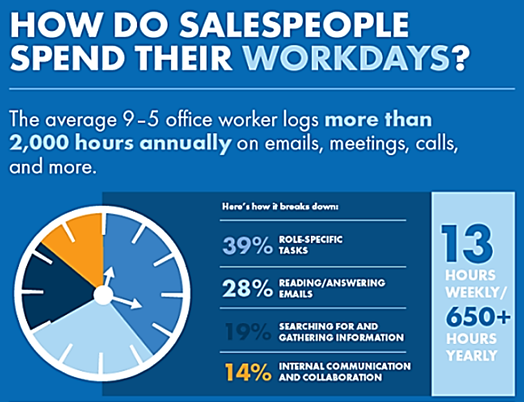Here are 16 ways salespeople can stay more organized (and sell more):
- Reduce Administrative Tasks
- Route Planning
- Qualify Prospects
- Automation
- Stop Procrastinating
- Learn to Say No
- Dial in The Process
- Ride the Momentum
- Avoid The Urge to Multitask
- Manage Your Inbox
- Eliminate Distractions
- Create Your To-Do List The Night Before
- Use Time Blocks
- 80/20 Rule
- Build Your Schedule Around The Buyer
- Expect To Pivot
Since the dawn of time, getting sales reps to better organize and manage their days has been plaguing teams from reaching optimum efficiency. Salespeople have been spending more of their time on administrative tasks than they have actually selling.
In addition to what you should be doing, sales time management often comes down to what you shouldn’t be doing.
In order to double your selling time you need to place as much of a focus on eliminating the tasks you shouldn’t be doing as the ones you should. The primary reason for this is the countless number of activities that simply waste your time each day without contributing to helping achieve sales targets.
The timeless phrase “time is money” has never been more accurate for outside sales organizations. Prioritizing your workday can often result in the difference between closing a deal and being shut out. When your time is used in a strategic approach, you’re more likely to record your biggest week or break out of a slump.

While there’s many upsides to this specific topic, organization is commonly one of the most challenging things for field sales reps to completely comprehend and implement. With the number of things that need to be done on a day to day basis, field salespeople have numerous things competing for their attention.
Time management in sales comes down to how you’ll prioritize and maximize your time each day. Instead of working more hours, which takes you away from your personal life, a few easy-to-use organizational tips can drastically improve your efficiency.
16 Tips to Help Every Salesperson Stay Organized (and Spend More Time Selling)
1. Reduce Administrative Tasks
Administrative tasks are the number one thing preventing sales from spending more time in the field, where they should be. Look for the admin work that can be automated through one tool or another. The minutes, and even seconds, you can save will begin to add up quickly, even if you don’t realize it initially.
Aside from just saving time, you will feel less flustered by the number of things weighing on them on a daily basis. This will allow sales reps to divert more of their energy and attention away from mundane tasks, and focus on things like running demos or answering questions that show buying potential.
A couple tips:
- To-do List: a to-do list app, uses AI to learn your personal productivity habits and schedule your overdue tasks accordingly. In other words, the app will figure out the optimal time for you to get everything done.
- Mailchimp: the world’s largest marketing automation platform. It’s like a second brain that helps millions of customers—from small e-commerce shops to big online retailers—find their audience and engage their customers.
2. Route Planning
Implementing a tool with route optimization is an extremely simple way to boost the production of your field team. When you give reps the power to optimize their routes, they won’t be wasting valuable time driving back and forth across town.
3. Qualify Prospects
Use the lead machine prospecting tool to narrow in on ONLY those people in your territory that meet the demographic details of your ideal customer profile.
As you add your desired customer criteria, the number of leads decrease as Lead Machine hones in on your target customers. No more time wasted selling to people who have no interest in your product or service.
4. Automation
The more you can automate, the more efficient you become. And thanks to the world of technology and open API’s, to some degree or another, you have the ability to automate almost every part of your day.
But what – and how – are sale professionals such as yourself automating their business processes?
Whether it’s lead creation, CRM data entry, opportunity creation, or document management (just to name a few), sales enablement platforms like SPOTIO give you the power to choose from hundreds of business process services to expedite every facet of your sales activity and tracking tasks.
As a sales person, the more redundant and administrative type tasks you can streamline, the more time you will spend face to face charming your next buyer into a purchase.
5. Stop Procrastinating
Procrastination is extremely detrimental to field sales reps. It’s most often associated with the tasks salespeople despise, like updating their CRM and other administrative work. Utilizing time blocks is a great way to eliminate procrastinating. Breaking your work down into smaller steps is also an effective sales organization tip. Being detailed in your daily tasks is another technique that has proven effective. By knowing exactly what you have to do throughout the day, you can remain focused.

6. Learn to Say No
Saying no to a manager or superior can be a scary proposition, but it’s one of the best sales rep organization tips to get the most out of your day. The first marketing manager we had at SPOTIO is the inspiration for this salesperson organization technique. He often told people in our organization that he couldn’t answer our questions or help us complete a task we needed assistance on.
He handled it in a very respectful way. He told us when he had time available or requested that we schedule an appointment on his calendar. What surprised our team was that he handled these situations the same way with everyone in the company, including the CEO.
It wasn’t until after talking to the CEO about how he structured his day that I really put much thought into it. Our CEO had a lot of respect for how plugged in he was on a daily basis, and how he had the discipline to tell each of us that he couldn’t do what we needed the second we asked him. This structure allowed him to remain extremely dialed in and focused on the task at hand.
Might we recommend the book ‘Essentialism’. This is a great reach which shows you how streamline your days by focusing only on things that are crucial to your end goal, and eliminating all things that are not absolutely necessary.

7. Dial in The Process
One task inhibiting sales rep organization is their pitch. Scripts are often looked down on, and not a “fan favorite” for salespeople, but they usually serve a quality purpose. Many prospects are similar to each other, which is why your company develops their ideal customer profile.
Instead of generating a completely new list of qualification questions for each prospect you speak with, create a set of core questions that you can use as your framework and customize when needed. This framework can be applied to other tasks that eat up a lot of time as well.
Some Example Questions You Can Use:
How many salespeople do you have?
What’s your biggest challenge when it comes to managing your sales reps?
Tell me about your situation… why are you on the market for a new product?
What’s your biggest challenge right now?
How long has this problem been going on?
Have you tried to fix it?
What do you think it’s costing you?
How quickly do you need it fixed?
Take prospecting, for example. Develop a way to research and find prospects based on the previous accounts you’ve won. Look for the similarities that show up throughout these accounts over and over. Once you know which data sources are the most valuable, you can immediately go to those sources when researching new opportunities.
8. Ride the Momentum
After winning a deal, completing an important task, or reaching a milestone, your sales reps first instinct may be to reward themselves with a break. But this seemingly harmless practice is actually counterproductive. Instead of taking a break, it’s best to build on our success and dive right into another call.
Momentum is powerful, and difficult to come by. Your salespeople should use the positive flow of energy and confidence to get going right away with another opportunity.
9. Avoid The Urge to Multitask
The perception that those who are blessed with the ability to multitask are more productive workers could not be farther from the truth. Multitasking is a productivity facade. Yes, you’re checking off more boxes and hustling down your to-do list, but you’re not putting forth your best work. Liken this to quantity versus quality.
A study reported in the Journal of Experimental Psychology shows that you lose up to 40% of your productivity when trying to do more than one thing at the same time.
The reason is because your mind operates far better when it can focus on one thing at a time. Each type of task requires you to think in a unique way, so by switching from one to-do to another, you’re confusing your brain. So instead of pulling the rug out from under your current task, stay the course and avoid switching to something new. Let your mind get comfy and settle on one thing at a time.
10. Manage Your Inbox
If you’re like most people, your inbox is sure to be a cluttered mess on a daily basis. Start by blocking off time on your calendar each day to read and respond to emails. Remember that time blocks are going to be your best friend. Eliminate all distractions during this time to complete the task as efficiently and effectively as possible.
 Create an auto-reply email that goes out anytime you receive a new message. Tim Ferriss from The 4-Hour Work Week created a pretty witty template you can replicate:
Create an auto-reply email that goes out anytime you receive a new message. Tim Ferriss from The 4-Hour Work Week created a pretty witty template you can replicate:
“Due to high workload, I am currently checking and responding to email twice daily at 12:00pm ET [or your time zone] and 4:00pm ET.
If you require urgent assistance (please ensure it is urgent) that cannot wait until either 12:00pm or 4:00pm, please contact me via phone at 555-555-5555.”
As you work through the sorting process, identify emails you can take action on immediately. The thought is to prevent delaying something until a later time when you can accomplish a desired action immediately. Look for the emails that you can instantly delete, like spam or promos. Use labels and folders as much as possible to remain as organized as possible without doing any work.
The final thing you can do to manage your inbox more effectively is to unsubscribe from unwanted messages. Sure, it might take a minute or two to complete that process, but it is much more efficient to unsubscribe than it is to get an email from the same company twice a week that you’re just going to delete anyways.
We suggest using a tool like unroll.me to manage and automate this process.
11. Eliminate Distractions
It can be hard to stay focused when your favorite time-wasting site is just a click away. To ensure you stay focused, ruthlessly get rid of every distraction. If you don’t use a website for your job, block it using the browser extension Blocksite.
Reps should also stow their cell phones out of sight. It’s all too tempting to check social media or your texts if you can see or hear notifications come up.
12. Create Your To-Do List The Night Before

Instead of wasting your productive mornings organizing your day, do it right before you leave for the night. That way, you can get right to work when you come into the office the next day. Save tasks like these for when you’re burned out in the evenings, and make the most of the time you have.
13. Use Time Blocks
The Pomodoro Technique is a time management strategy invented by Francesco Cirillo designed to boost productivity by segmenting your day between bouts of intense focus and short breaks.
14. 80/20 Rule

The 80/20 rule (Pareto Principle) is nothing new to the majority of salespeople. The rule follows the principle that 20% of your time produces 80% of your results. The goal is to focus your time, effort and energy on the tasks that will result in a maximum return on your investment. Reduce the hours you put into the tasks that are likely to have minimal impact on achieving your sales targets.
For field sales reps, the best way to think of and apply the 80/20 rule is to recognize that 80% of your sales will come from 20% of your customers. Sales rep organization comes down to knowing where to focus your attention. This places an increased emphasis on qualifying prospects sooner rather than later.
Qualification is exceptionally important as it pertains to the 80/20 rule because you’ll undoubtedly have names in your pipeline that will never convert, while others will become high-value, long-term customers, but you have to know how to spot them. Keep this in mind: if you’re speaking to an unqualified prospect, you’re not actually selling.
15. Build Your Schedule Around The Buyer
According to experts, the best time to connect with prospects is in the afternoon, the very early morning, the evening, the late-mid early morning, or on weekends. I think that about covers it. As you probably know, there is no perfect time to connect with your target buyers. It really depends on that particular buyer’s behavior and the way they allocate time to get their jobs done.
If a salesperson is selling to contractors, calling at 10:00 a.m. isn’t going to work because they’re already busy on the job site. Calling on a restaurant with a thriving lunch and dinner business any time after noon is probably not going to yield a favorable conversation. Strive to structure your day around your target buyer’s schedule to avoid wasted time and unanswered calls.
16. Expect To Pivot
Being in outside sales, organize your leads by location and always have the date of your last contact for each prospect noted. If you get stood up for an appointment, you can quickly regroup and connect with other nearby prospects to secure a new meeting rather than drive back to the office or cool your heels in a coffee shop until the next meeting. To help manage this process, a tool like SPOTIO’s Lead Management feature is a tremendous help improving sales efficiency while you’re out in the field.
This tactic also applies to inside sales. Prospects cancel all the time, so salespeople should always be prepared to pivot into other profitable activities. The trick is to not shift gears on those activities. Say you’re prepared to have an exploratory call scheduled to run an hour and the prospects flakes on you. Since you’re already in the mindset of the exploratory call, spend that reclaimed hour prepping for other exploratory calls you have booked that week. Your mind is already focused on the exploratory process. Keep it there.
I’m sure some of you are saying to yourselves, that’s foolish advice — you should use that time to prospect or make follow-up calls. But here’s the thing. Unless you have your leads at the ready and you’re fully prepped to prospect, the odds are you’ll waste time getting ready to make those calls.
Conclusion
The goal is to work smarter as opposed to harder. Nobody wants to work longer hours to make the same money or meet their sales targets. By eliminating distractions and having a strategic, focused approach, you’re going to spend more time doing the things that will actually lead to sales.

______
Questions or comments? Contact SPOTIO at [email protected] or comment below.
SPOTIO is the #1 field sales automation and performance management software that will increase revenue, maximize profitability, and boost sales productivity.
Want to see a product demonstration? Click here to see how SPOTIO can take your sales game to the next level.







![Sales Leaderboards: The Complete 2026 Guide [+ Best Software]](https://spotio.com/wp-content/uploads/2025/04/SPOTIO-Blog-Sales-Leaderboard-Awards--768x384.jpg)
